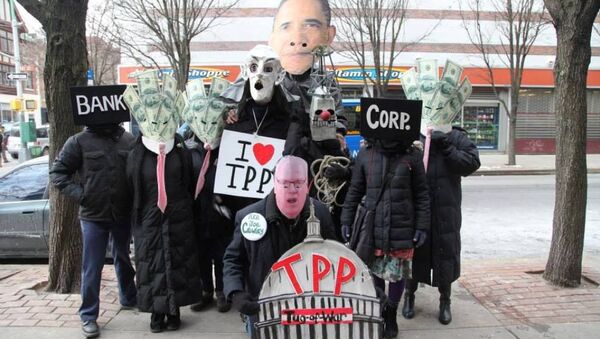The deal between the US and 11 other countries: Japan, Australia, New Zealand, Singapore, Vietnam, Brunei, Canada Chile, Mexico, Malaysia and Peru represents 40 percent of the global economy but the talks have been held behind closed doors.
"Powerful groups work behind the scenes to get things the way they want them," trade policy analyst Simon Lester told Sputnik.
"We will be able to pick this apart — once we get access to the documents," Lester said.
Supporters of the TPP deal say it will make trade easier between the countries involved. Skeptics and human rights campaigners remain concerned over the impacts it will have on local businesses and workers' rights.
"We're talking about stronger labor rules, the US government will be able to use its leverage over other countries to impose stronger labor laws."
Meanwhile, Jessa Boehner from the Public Citizen's Global Trade Watch told Sputnik that "the TPP has the potential to do large amounts of harm.
Victory for Big Pharma,multinationals & secrecy vs. workers' rights, affordable medicine & transparency/#TPP
— Katrina vandenHeuvel (@KatrinaNation) October 5, 2015
"It's not really about trade — we consider it to be a wish list of the 'asks' of the largest multinational corporations — expanding the monopoly on drug patents, rolling back on regulations on Wall Street, rolling back on US policies and incentives to offshore US jobs.
"It's all been negotiated behind closed doors. We see the TPP deal as extremely concerning."
Boehner told Sputnik that the details of the agreement aren't set to be disclosed to the public for another few weeks, so it's still premature whether the US Congress will ratify the deal.
TPP Deal Struck As "Corporate Secrecy" Wins Again http://t.co/XEtFVRWyBC pic.twitter.com/fbhV995c7r
— 反安倍あざらし隊 (@MetalGodTokyo) October 5, 2015
Lester believes congress will be split down the middle.
"Republicans are going to have to do some deep thinking," he said.
"They're going to have to look at all the terms too — this is not an easy time for Congress to get things easily done. We have a republican congress fighting with a democratic president."
But it remains unclear whether the deal strikes a balance between corporate and human interests. Simon Lister for one, is looking forward to scrutinizing the details — especially the extent of tobacco companies' exclusion from investment rules.
"I hope there's a lot of good things in there", he said.
"Once we get access to it that is — then the public will be able to pick it apart."
Five hundred companies have been represented in the biggest trade deal in decades — a deal held behind closed doors.

